

Dealing With Bullying. Listen What If You're the Bully?

All of us have to deal with a lot of difficult situations and emotions. When some people feel stressed, angry, or frustrated, picking on someone else can be a quick escape — it takes the attention away from them and their problems. Some bullies learn from firsthand experience. Perhaps name-calling, putdowns, or physical force are the norms in their families. If you find it hard to resist the temptation to bully, you might want to talk with someone you look up to. Bullying behavior backfires and makes everyone feel miserable — even the bullies. Volunteer for Social Change. Welcome to DoSomething.org, a global movement of millions of young people making positive change, online and off!
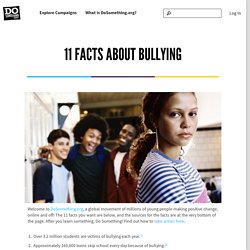
The 11 facts you want are below, and the sources for the facts are at the very bottom of the page. After you learn something, Do Something! Find out how to take action here. Over 3.2 million students are victims of bullying each year.Approximately 160,000 teens skip school every day because of bullying.17% of American students report being bullied 2 to 3 times a month or more within a school semester.
The Psychological Effects of Bullying on Kids & Teens. We've all been there.
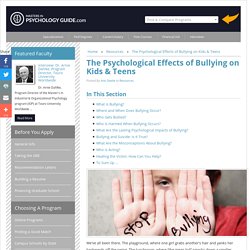
The playground, where one girl grabs another's hair and yanks her backwards off the swing. The lunchroom, where “the mean kid” smacks down a smaller boy's tray, spilling his food. The classroom, where a group of kids repeatedly taunt the youngest child in the class for being stupid. From the vantage point of adulthood, bullying is mean-spirited and pointless, but it is unfortunately a regular part of childhood. (Indeed, even some adults haven't grown out of the habit of belittling others and pushing them around.) As with any public discourse, this inevitably means confusion, misunderstanding and misconception on the part of listeners. We will start with a definition of bullying and a look at where it occurs and who is usually victimized. What Is Bullying? Although at first it may seem simple to define what constitutes bullying behavior, it does not always fit the classic stereotype of the older boy beating up his smaller classmate.
Who Gets Bullied? The Victim Both. Cyberbullying - National Bullying Prevention Center. Just as the use of technology itself has evolved, so has the ability to bully.
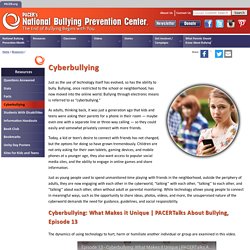
Bullying, once restricted to the school or neighborhood, has now moved into the online world. Bullying through electronic means is referred to as “cyberbullying.” As adults, thinking back, it was just a generation ago that kids and teens were asking their parents for a phone in their room — maybe even one with a separate line or three-way calling — so they could easily and somewhat privately connect with more friends. Today, a kid or teen’s desire to connect with friends has not changed, but the options for doing so have grown tremendously. An Update on Alex Libby. A common theme in the numerous comments we’ve received to-date on the film Bully, centers on one of the film’s most moving characters, Alex Libby, a sweet-natured Iowa teen who had been bullied for years.

Since many viewers were worried about him and were understandably empathetic, we thought it might be good to give you an update on Alex. First of all, to cut to the chase in the happiest of ways: this year Alex worked as an intern for the Bully Project itself, in their offices in New York City! Bullying Definition. Bullying is unwanted, aggressive behavior among school aged children that involves a real or perceived power imbalance.
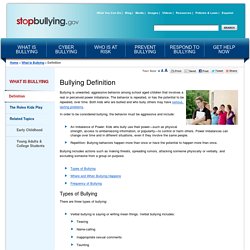
The behavior is repeated, or has the potential to be repeated, over time. Both kids who are bullied and who bully others may have serious, lasting problems. In order to be considered bullying, the behavior must be aggressive and include: An Imbalance of Power: Kids who bully use their power—such as physical strength, access to embarrassing information, or popularity—to control or harm others.
Power imbalances can change over time and in different situations, even if they involve the same people. Bullying Statistics - National Bullying Prevention Center. Effects of Bullying Students who experience bullying are at increased risk for poor school adjustment, sleep difficulties, anxiety, and depression (Center for Disease Control, 2015).
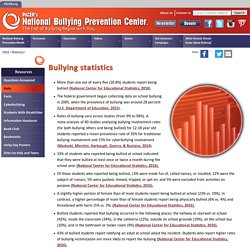
Students who are both targets of bullying and engage in bullying behavior are at greater risk for both mental health and behavior problems than students who only bully or are only bullied (Center for Disease Control, 2015). Bullied students indicate that bullying has a negative effect on how they feel about themselves (19%), their relationships with friends and family and on their school work (14%), and physical health (9%) (National Center for Educational Statistics, 2016).
Students who experience bullying are twice as likely as non-bullied peers to experience negative health effects such as headaches and stomachaches (Gini & Pozzoli, 2013). Cyberbullying. Articles about Bullying - latimes. June 19, 2013 | By Mary MacVean Has anyone with a sibling not been in the back seat of a car, someone hitting someone and parents threatening to pull over “right this minute”?
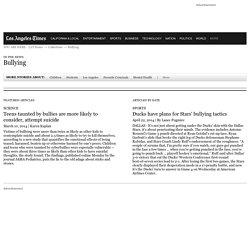
Just seems like part of growing up, right? Well some researchers say not necessarily. Parents, doctors and schools should not dismiss sibling bullying, they said. Sibling aggression can be as damaging as other sorts of bullying, and it can be linked to poorer mental health, according to a study published this week in the journal Pediatrics. October 19, 2013 | By Matt Hamilton An Illinois dad got the call on Thursday that no parent ever wants to receive. October 21, 2013 | Sandy Banks It seems to happen often enough that we're no longer shocked to hear it: A teenager commits suicide after being bullied online by peers.